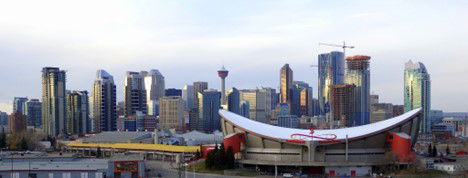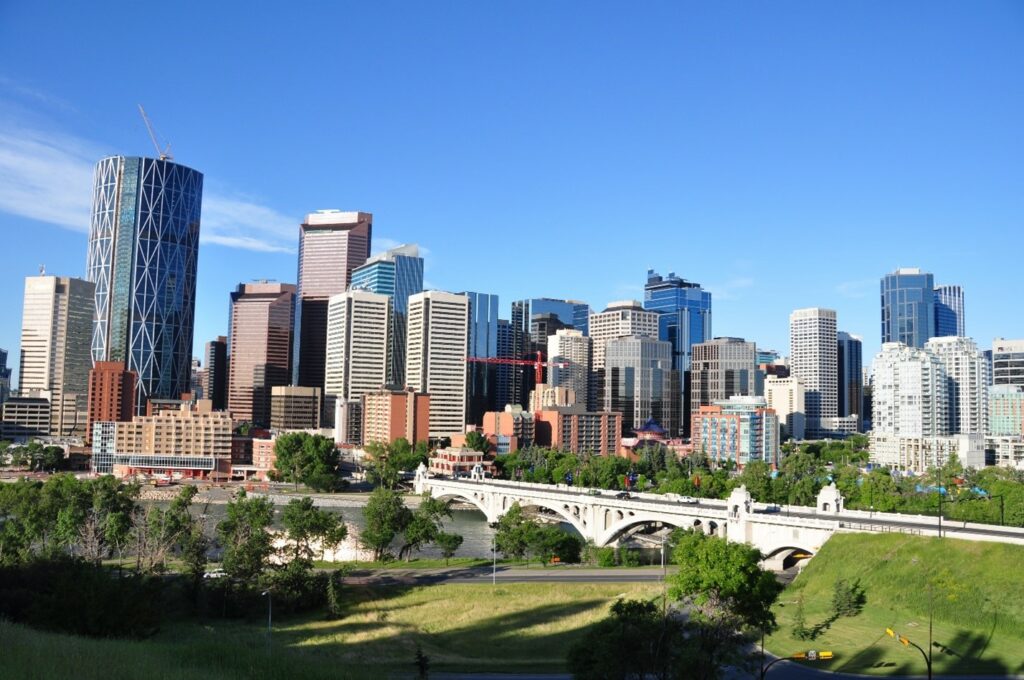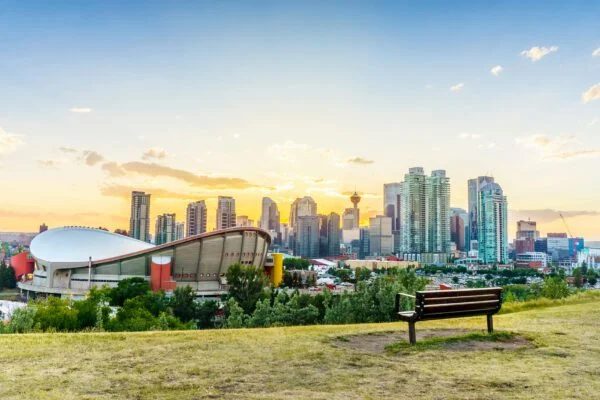MOVING FROM ONTARIO TO CALGARY – THE ULTIMATE GUIDE

Introduction
Are you planning to move from Ontario to Calgary, Alberta? This transition marks an exciting phase in your life, offering new opportunities, experiences, and challenges. Calgary, known for its dynamic urban environment nestled within breathtaking natural landscapes, presents a unique lifestyle. This guide is designed to make your move as smooth and informed as possible, covering essential aspects such as housing, employment, education, healthcare, transportation, and leisure activities.
Fun Facts about Calgary
- Sunniest Major City in Canada: Calgary boasts being the sunniest major city in Canada, with about 2396 hours of sunshine per year, which translates to approximately 333 days of sunshine annually [source].
- Nickname – “Cowtown”: The city is often referred to as “Cowtown,” highlighting its historic and ongoing connections to the ranching and cowboy culture [source].
- Vast Parkland: Calgary is home to over 7,000 hectares of parkland, offering residents and visitors extensive green spaces to explore [source].
- Calgary Stampede: Known as “The Greatest Outdoor Show on Earth,” the Calgary Stampede is a world-famous annual event featuring rodeo competitions, exhibitions, and entertainment [source].
- Calgary Tower: An iconic part of the city’s skyline, the Calgary Tower offers panoramic views of the city and the Rocky Mountains.
- Olympic History: Calgary hosted the XV Olympic Winter Games in 1988, making it the first Canadian city to host the Winter Olympics.
- Cultural Diversity: The city is known for its cultural diversity, with a vibrant arts and culture scene and numerous ethnic communities.
- Educational Hub: Home to several universities and colleges, including the University of Calgary, Calgary is a center for higher education and research in the region.
- Economic Powerhouse: Calgary is one of Canada’s major economic centers, particularly known for its energy sector, including oil and gas.
- Gateway to the Rockies: The city serves as a gateway to the Rocky Mountains, providing easy access to natural wonders like Banff and Jasper National Parks.
- Innovative Architecture: Calgary’s downtown features innovative architecture, including unique buildings like the Bow and the Studio Bell, home of the National Music Centre.
- Extensive Bike Path System: The city has an extensive network of bike paths, making it one of the most bike-friendly cities in North America.
- Fish Creek Provincial Park: One of the largest urban parks in Canada, Fish Creek Provincial Park offers a natural retreat within the city limits.
- Heritage Park Historical Village: This park is Canada’s largest living history museum, showcasing life in Western Canada from the 1860s to the 1950s.
- Zoo and Botanical Gardens: The Calgary Zoo is one of the most visited zoos in Canada, and it includes a botanical garden and a prehistoric park.
Understanding Calgary’s Housing Market
Calgary’s housing market is diverse, offering a range of options from modern condos to spacious family homes. Unlike some parts of Ontario, especially Toronto and the surrounding areas, Calgary’s real estate is generally more affordable. However, prices can vary significantly based on neighborhoods, with areas like Aspen Woods and Britannia ranking among the priciest. It’s crucial to research and identify a neighborhood that aligns with your lifestyle and budget.

Is it better to buy or rent in Calgary?
Calgary’s rental market is forecasted to tighten even further in 2024, becoming more competitive, with increased demand likely leading to higher rental prices. This trend indicates a challenging situation for renters in the city.
2024 might be the perfect time to buy a home, especially for first-time homebuyers. “I would expect the market to be in a buyer’s market for most of 2024 in Canada,” says Foch. His advice stems from the fact that interest rates are not expected to return to the lows of the early 2020s anytime soon, which means there will be less competition for available homes.
| City | Price Jan 2023 | Price October 2023 | Percentage Change |
| Calgary | $506,100 | $555,400 | ⬆ 9.74% |
| Edmonton | $359,500 | $370,400 | ⬆ 3.03% |
| Greater Toronto Area | $1,070,600` | $1,103,600 | ⬆ 3.08% |
| Greater Vancouver Area | $1,114,800 | $1,196,500 | ⬆ 7.32% |
| Halifax | $502,600 | $528,200 | ⬆ 5.09% |
| Ottawa | $602,500 | $638,600 | ⬆ 5.99% |
| Winnipeg | $326,800 | $340,300 | ⬆ 4.13% |
Employment Opportunities in Calgary
As of 2024, Calgary presents a dynamic job market with diverse opportunities across various sectors. Here’s an overview of the employment landscape in Calgary:
- Variety of Job Openings: There are 1,434 job openings available in Calgary, indicating a robust job market in the city [source].
- New Opportunities in 2024: The year 2024 has brought forth 431 new job opportunities, showcasing the city’s economic growth and the creation of new roles [source].
- City Employment Opportunities: The City of Calgary offers various job opportunities, accessible through their official website [source].
- High-Demand Occupations: Key occupations identified as high in demand for the 2022-2024 period include restaurant and food service managers, and software engineers [source].
- Salary Ranges: Job opportunities in Calgary offer competitive salaries, ranging from $20 to $39 per hour, covering a wide spectrum of industries [source].
- Comprehensive Job Listings: AlbertaJobcentre.ca provides an extensive listing of available jobs in Calgary, along with career advice and interview tips, making it a valuable resource for job seekers [source].
Overall, Calgary’s employment scene in 2024 is vibrant and varied, offering opportunities across different sectors and accommodating a range of skill sets and experience levels.

Education: Schools and Universities
For families with children, education is a top priority. Calgary boasts a high-quality education system, with public, Catholic, and private school options. Post-secondary education is equally impressive, with institutions like the University of Calgary and SAIT Polytechnic offering a wide range of programs. Researching schools and their catchment areas is essential when choosing where to live.
Here are the top universities and colleges in Calgary:
| No | University/ College | Ranking | Average Fee |
| 1 | University of Calgary | 182 (QS Global ranking) | $32,208 |
| 2 | Mount Royal University | 52 (Edurank National ranking) | $25,000 – $27,000 |
| 3 | Southern Alberta Institute of Technology (SAIT) | 45 (QS Ranking for Hospitality and Tourism) | CA $19,000 – $25,000 |
| 4 | Bow Valley College | 104 (Webometrics national rank) | CA $18,000 – $35,000 |
| 5 | St Mary’s University | N.A | CA $26,580 |
| 6 | ABM College | 236 (Webometrics national rank) | CA $13,000 – $30,000 |
| 7 | Alberta University of Arts | 171 (Webometrics national rank) | CA $20,000 |
Navigating Healthcare in Calgary
Access to healthcare is a critical consideration. Calgary offers excellent healthcare services, including hospitals like the Foothills Medical Centre and the Alberta Children’s Hospital. Upon arrival, it’s important to register for the Alberta Health Care Insurance Plan to ensure you have access to these services.
Typical emergency department wait times at the Calgary hospitals is as follows:
- 2 hr 57 min. Alberta Children’s Hospital. Open 24 hours for patients 17 & under (two adult family/support persons allowed) …
- 3 hr 34 min. Foothills Medical Centre. Open 24 hours. …
- 4 hr 59 min. Peter Lougheed Centre. …
- 3 hr 19 min. Rockyview General Hospital. …
- 5 hr 22 min. South Health Campus.
Getting Health Insurance
When moving from Ontario to Calgary, Alberta, it’s crucial to manage your health insurance transition effectively. As a new resident in Alberta, you must apply for Alberta Health Care Insurance Plan (AHCIP) coverage. It’s important to do this within the first three months of establishing residency in Alberta. During your move, your Ontario Health Insurance Plan (OHIP) will continue to cover you, but make sure your health card is still valid before traveling. In case of any gaps in coverage during the transition, consider purchasing private health insurance as a temporary solution. Once in Alberta, you can access insured health services at publicly funded or general hospitals across Canada, with most bills being directly billed to AHC.
The current monthly premium rate for Non-Group coverage is as follows:
| Monthly Rates | Single | Family |
| Full Premium | $63.50 | $118.00 |
| Subsidized Premiums | $44.45 | $82.60 |
Transportation: Getting Around in Calgary
Calgary’s public transportation system, including buses and the C-Train light rail, is efficient and covers most of the city. You can find current public transit fares HERE.
| Fares | ||
| Cash Fares (One time use, valid for 90 min) | Tickets (Cash fares bought in books of 10) | |
| Adult Ages 18 and older | $3.70 | $37.00 |
| Youth Ages 13-17 * | $2.50 | $25.00 |
| Children Ages 12 and under. | Free | Free |
| Passes | ||
| Day Pass (Valid until the end of service that day) | Monthly Pass (Valid for 1 calendar month) | |
| Adult Ages 18 and older | $11.60 | $115.00 |
| Youth Ages 13-17 | $8.50 | $82.00 |
If you prefer driving, Calgary’s road network is extensive, though winter driving can be challenging. Cycling enthusiasts will appreciate the city’s extensive bike paths.
Exchange Your Driver’s Licence
Upon relocating to Alberta, you have a 90-day window to exchange your out-of-province license for an Alberta driver’s license. This process must be completed in person at any Alberta Motor Association (AMA) centre or a similar registry service provider. It’s important to note that all driver’s license exchanges are required to be done face-to-face. If you hold a Class 4 license or have any medical conditions, a Driver’s Medical examination by an Alberta doctor is necessary. Remember to bring your current driver’s license and proof of your identity for the exchange process.
Embracing Calgary’s Climate
Calgary’s climate can be a significant change, especially for those from Southern Ontario. Expect colder winters with more snow, but also enjoy more sunny days. Dressing in layers and investing in good winter gear is essential.
Leisure and Recreation
Calgary is a haven for outdoor enthusiasts. With proximity to the Rocky Mountains, activities like hiking, skiing, and mountain biking are popular. The city also hosts numerous festivals and events, including the famous Calgary Stampede. Cultural offerings include museums, galleries, and a vibrant dining scene.
Building Your Social Network
Relocating often means leaving behind a social network. In Calgary, there are numerous ways to meet new people and build friendships. Community centers, sports clubs, and local events are great places to start. Calgary’s diverse and welcoming community makes it easier to find your niche.
Cost of Living Comparison
Comparing the cost of living between Ontario and Calgary is essential. Generally, Calgary offers a more affordable cost of living, especially in terms of housing and utilities. However, it’s important to consider other expenses like transportation, healthcare, and leisure activities.
- Consumer Prices in Calgary are 1.2% higher than in Toronto (without rent)
- Consumer Prices Including Rent in Calgary are 12.3% lower than in Toronto
- Rent Prices in Calgary are 33.7% lower than in Toronto
- Restaurant Prices in Calgary are 5.2% lower than in Toronto
- Groceries Prices in Calgary are 1.6% lower than in Toronto
- Local Purchasing Power in Calgary is 14.1% higher than in Toronto
Best places to live in Calgary
Of course, there are many great places to live in Calgary. Which area is right for you will depend on your budget, lifestyle, and preferences. But whether you’re looking for a family-friendly neighbourhood or a bustling urban area, we’ve got you covered.
Calgary is a big city, so we’ll be tackling it by quadrant. That way, you can easily find the best neighbourhood for you depending on your location preferences. So, without further ado, here are the best areas to live in Calgary!

Preparing for the Move: Checklist
A successful move requires careful planning. Here’s a checklist to ensure you cover all bases:
- Secure housing in Calgary.
- Arrange employment or confirm job transfer.
- Research schools and register children if applicable.
- Plan your moving logistics, including hiring movers and transferring utilities.
- Update your address and arrange for mail forwarding.
- Prepare for the climate change with appropriate clothing and gear.
- Register for healthcare in Alberta.
Conclusion
Moving from Ontario to Calgary is a significant step, promising a blend of urban living and outdoor adventure. By considering aspects like housing, employment, education, and lifestyle, you can ensure a smooth transition. Calgary’s welcoming community and diverse opportunities are ready to embrace you, offering a unique and enriching experience. Welcome to your new home in Calgary, Alberta – a place where city life and natural beauty coexist in harmony.






